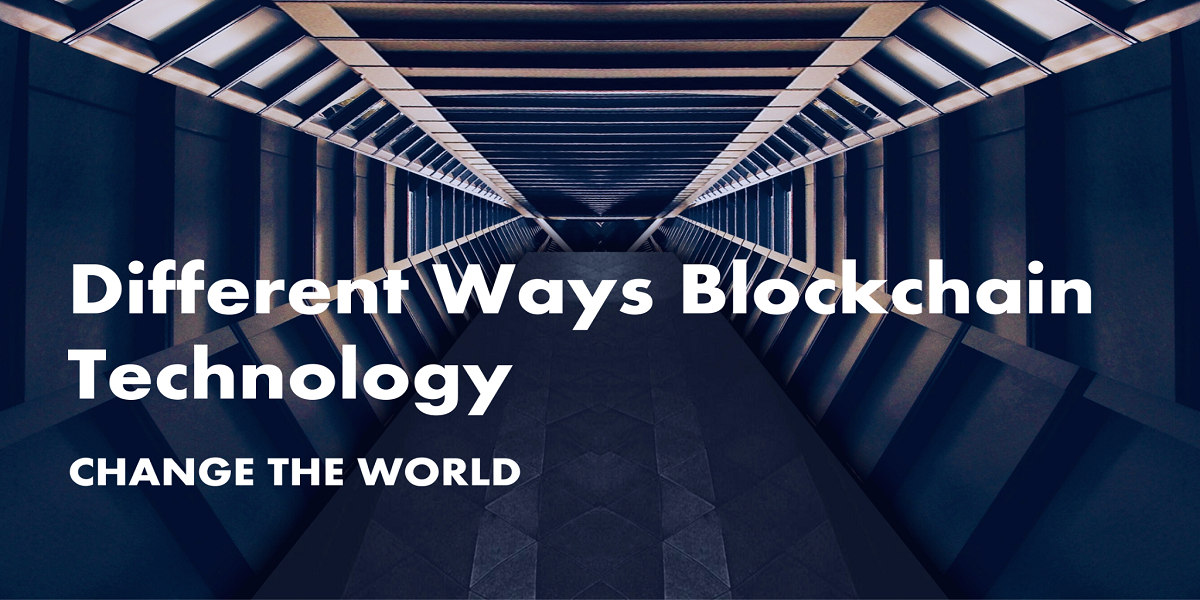Different Ways Blockchain Technology Change the World
- By David Jones
- 26-08-2022
- Blockchain

The notion of decentralization is where the notion of blockchain altering the world first emerged. People are growing accustomed to technology, and the more we use it, the more dependent we become on it. The decentralized cryptocurrency was developed around the time of the previous global financial crisis, which gives this revelation even more significance if you look at the timeframe. Here are five creative ways businesses use blockchain development services to create fresh approaches to age-old issues.
FINTECH :
FinTech, which stands for "financial technologies," is often utilized by banks and other financial institutions to offer consumers and businesses more effective transaction choices. This is in contrast to the platforms that enable cryptocurrencies.
Blockchain technology is used in FinTech as a reliable and secure foundation for systems that enable money transfers. For instance, the money-transfer website TransferWise can offer same-day foreign currency conversions for costs up to 90% lower than what banks charge for the same service.
Adyen, an Amsterdam-based payment platform, offers businesses worldwide an omnichannel checkout software that enables enterprises to take payments for goods and services in any currency and format.
Fundraising departments and organizations can use finTech-enabled apps to collect and track donations, and platforms for crowdfunding benefit from an additional degree of security when they are supported by blockchain technology.
Consumers may now use their mobile devices to pay for goods and services without the security dangers they would have had to deal with just a year or two ago, thanks to fintech.
FinTech, which is powered by blockchain, significantly reduces the size of the world market.
INFORMATION SHARE :
Everipedia, the first blockchain-based encyclopedia in the world, recently revealed intentions to create a brand-new open-source wiki network that will decentralize the Wikipedia knowledge base by enabling each contributor to become a network stakeholder.
Beginning in January 2018, the EOS blockchain engine will be used by Everipedia, whose Chief Information Officer is Wikipedia co-founder Larry Sanger, to increase the accountability of user contributors. At that moment, editors will start acquiring tokens—virtual shares in the platform—based on their "IQs" (points earned for making significant contributions).
INTERACTION IN THE CRATES :
Every day, billions of consumer-advertiser interactions take place on the internet. Yet, the system that delivers tailored messaging - whether through search engines or social media platforms - has drawbacks, mostly in fraud and transparency problems.
BROWSERS The interaction between users, publishers, and advertisers is elevated to a new level by Brave, a blockchain-enabled internet browser.
Users may surf without advertisements or tracking, thanks to Brave. Instead, companies offer tokens (BATs or Basic Attention Tokens) to users in exchange for interactions with their content, and users can also award content creators for valuable contributions. According to how much time users spend on Brave-verified websites and YouTube channels, the browser also gives BAT "tips" to those resources.
MARKETING STRATEGIES :
Advertising platforms like ClearCoin and MetaX use blockchain technology to offer safe, open advertising transactions to customers worldwide.
These businesses offer a solid, market-driven economic underpinning, quick, secure transactions for all parties, accurate, real-time data reporting, and a sharp decline in ad fraud by handling the buying and selling of advertising through a blockchain platform.
The chance to be a stakeholder in the encyclopedia they edit and receive genuine financial value back, according to Theodor Forselius, co-founder and CEO of Everipedia, "is incredibly exciting to me."
Users will need to pay a token upfront before making edits; those whose edits are accepted will get the token back plus some, while those whose updates are rejected will lose it.
Forselius listed two other benefits of switching the Everipedia platform to a blockchain. One is that the information won't be stored on a centralized server. Thus, it will continue to exist even if the main Everipedia organization is destroyed in the future. The second is that it won't be censorable, so regimes that currently censor Wikipedia (like Turkey and Iran) won't be able to stop people from using the platform to contribute to it.
GROUP IN THE CLOUD :
In the bleak future depicted in Ernest Cline's book Ready Player One, most people spend their time in a virtual environment called OASIS. Aside from enabling avatars to move around and communicate with others, OASIS also boasts a functioning economy.
When the novel was first published in 2011, it was considered inventive science fiction. Still, advancements in VR technology and blockchain capabilities already point to future developments that could resemble OASIS.
In "a Blockchain and AI-powered metaverse that gives a truly immersive experience allow users to... go out to an entirely new place, world, universe, or galaxy where [they] decide the lifestyle and regulations," visitors to DenCity find themselves.
Participants can join the virtual society of Homestead Nebula in the first phase of DenCity, where they can acquire land, erect buildings, buy property, obtain employment, and engage in social interaction. The website claims that cryptocurrency earnings within DenCity can be added to physical wallets for real-world use.
Density is essentially an early-stage OASIS
Your avatar can go shopping on High Fidelity's Avatar Island. In this blockchain-powered online store, customers can buy user-generated virtual products for their avatars once they've settled in the Homestead Nebula.
On Avatar Island, there are presently more than 300 products for sale.
COLLECTIBLES :
Since Magic: The Gathering's debut in the early 1990s, collectible card games (CCGs) have gained popularity. However, up to the development of blockchain technology, creators of digital CCGs have faced several challenges.
Enter the Nova Token Platform, a blockchain-based trading card game platform that, curiously enough, counts Richard Garfield, the creator of Magic: The Gathering, among its advisors.
With blockchain application development, gamers may trade and sell cards in a safe and open environment with a permanent record of ownership. The virtual economic platform simultaneously enables global currency adjustments and pure market valuation, which eliminates regional discrepancies.
CATS!
The adoption of blockchain technology to satisfy internet users' infatuation with cats should also come as no surprise. (Laughing is permitted, but this is no joke!)
A blockchain-enabled website called CryptoKitties allows users to "collect and breed virtual cats."
The website CryptoKitties claims that "Crypto collectibles include CryptoKitties. Your CryptoKitty can be purchased, sold, or traded just like a conventional collectible, and you can do so with confidence knowing that a blockchain will securely track ownership."
Owners can breed virtual pets to produce new CryptoKitties with their distinctive genetic codes in addition to buying and selling digital collectibles.
On November 28, 2017, CryptoKitties was released. In its first week, collectors spent more than $2 million on the virtual cats, with the highest price paid for a single kitten reaching an astounding $117,712.
It may be argued that this use of blockchain technology is not inherently revolutionary. However, it shows how adaptable blockchain technology is and how it may be used in the entertainment sector.


.jpg)
.jpg)
.jpg)
